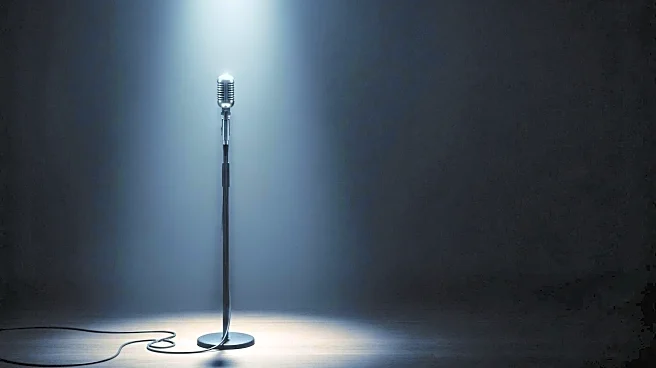What's Happening?
NYC-based singer-songwriter Evan Kreutz has released a new single titled 'deadbeat lullaby,' which serves as the lead track from his upcoming EP, 'look what i can do.' The song is an indie pop-rock piece that delves into themes of anxiety and self-worth. It begins with upbeat percussion and bright guitars, transitioning into a softer lullaby with piano and quiet vocals. Kreutz's lyrics candidly express his struggles with life plans not going as expected, as he sings about financial difficulties and self-doubt. His raw and self-deprecating humor is evident in the lyrics, making the song relatable to listeners who may have faced similar challenges.
Why It's Important?
The release of 'deadbeat lullaby' is significant as it highlights the growing trend of artists using their platforms to discuss personal and often difficult topics. Kreutz's willingness to share his financial struggles and feelings of inadequacy resonates with many, particularly in a time when economic uncertainty is prevalent. This openness can foster a sense of community and understanding among listeners who may feel isolated in their experiences. Additionally, Kreutz's approach to songwriting, which combines humor with vulnerability, offers a fresh perspective in the music industry, potentially influencing other artists to adopt a similar style.
What's Next?
As Kreutz continues to promote his new EP, it is likely that he will engage with his audience through social media and live performances, further building a connection with fans. The relatable nature of his music may attract a wider audience, leading to increased visibility and opportunities for collaboration with other artists. Additionally, the themes explored in 'deadbeat lullaby' could inspire discussions around mental health and financial stability, encouraging more open conversations in the music community and beyond.
Beyond the Headlines
Kreutz's candidness about his personal struggles in 'deadbeat lullaby' may have broader implications for the music industry, particularly in how artists address mental health and financial issues. By normalizing these discussions, Kreutz and others like him can contribute to a cultural shift that prioritizes transparency and support. This could lead to more resources and initiatives aimed at helping artists navigate the challenges of the industry, ultimately fostering a healthier environment for creative expression.










